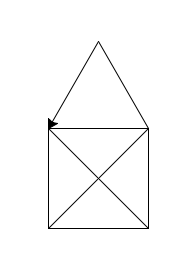Mindstorms: Playing and Learning from Mistakes
Seymour Papert lays down the foundations of his philosophy about programming and about learning in his book Mindstorms: Children, Computers, and Powerful Ideas was heavily involved with the creation of the programming language “Logo” (downloadable here). The main use of this programming language is education in general and learning to program as a side effect. It seems like no coincidence that the name of “Lego Mindstorms” is related to Papert’s book’s title, given that the ancestor of the Lego kit was programmed in Logo.
“Logo” in Python
There is a python module called “turtle” in python, that mimics the capabilities of Logo. This is what I used to create the figure below. There are many more examples online, f.ex. here. The point of turtle and Logo is to provide an interface that is easy to grasp, but that allows to build stepwise more and more complex things. I’ve seen an implementation of Tetris using turtle.

Learning and Playing
One of the first points of Papert is that the modern car was not created based on an analysis of the bad things of horse-powered coaches. Rather it happened because some people played around, “experimented” is probably a nicer word. Directly related to playing is the fact that you make mistakes. Which according to him is nothing bad as long as the mistakes are recognized and fixed. Unfortunately, some people are afraid of making mistakes. Papert calls this “Mathophobie”.
In that sense, Papert argues that it is a good thing if a (young) learner is following epistemology, following two approaches
- take “the novel”, the things to be learned, and provide a context with something already known
- take “the novel”, embrace it and adopt it, and make based on it something new.
The computer, and the turtle, or any programming language offer a valuable tool for playing, because it is very easy to fix mistakes! Hence, computers and programming can take away the fear of making mistakes! This sounds like such an awesome thing, but then, debugging can be quite painful! 😉
Mistakes in Hydro-Geo-Logy
Unfortunately, I am aware of only a very limited number of reported failures in hydro-geo-logy. “The Court of Miracles of Hydrology: can failure stories contribute to hydrological science? is one example. They build on Popper instead of Papert, but go along a similar vein. And in that issue of the journal there is a list of papers that deal with hydro-geo-logical mistakes. One example are models that are “right for the wrong reasons”.
Incentive
Keeping all this in mind will hopefully make me a better teacher in the coming term, but also hopefully keeps me constantly reminded to try out things, if nowhere else than in the code editors! When using Computers, I look a lot at data, process data, and analyze the results. Sometimes, it is quite astounding, it almost seems magic to me, that this entire process works. Inevitably, errors occur, and they need to be found and fixed.